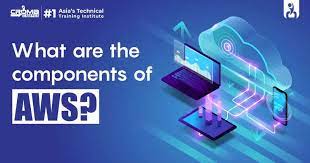A Brief Intro to AWS (Amazon Web Services)
With cloud computing, storage, and database services as well as machine learning, analytics, and Internet of Things services, AWS has quickly become a leading IT services provider. A pioneer in cloud computing, AWS Components enables businesses and developers to innovate and scale without significant initial investments. Moreover, Through its global network of data centers, AWS enables organizations to rapidly deploy applications and services, achieving greater agility.
Importance of AWS components for cloud-based solutions
AWS components play an important role in creating powerful cloud solutions. Second, These components deliver unprecedented scalability, flexibility, and efficiency. Moreover, With services including storage, databases, computing, networking, and more, AWS provides a flexible toolset for deploying, building, and managing applications in the cloud.
AWS components ensure seamless scalability to meet changing workloads, enhanced security through managed services, and cost-effective resource utilization. These components enable businesses to quickly adapt to technological advances, reduce infrastructure complexity, and drive innovation.
Lastly, AWS plays a key role in helping organizations exploit the full potential of cloud computing to streamline operations and accelerate digital transformation.
Brief mention of the scalability and flexibility benefits offered by AWS
AWS provides unparalleled scalability and flexibility, essential for modern businesses. Its cloud infrastructure allows for transparent scaling of resources, up or down. These are based on demand, ensuring optimal performance without over-provisioning. With AWS, businesses can quickly adapt to their changing needs, whether it’s rapid growth. Flexibility extends to a variety of computing models, storage solutions, and extension services, giving organizations the flexibility to choose the right tools for their specific needs. Lastly, this dynamic and scalable scalability enables businesses to rapidly innovate, optimize costs, and maintain a competitive advantage in the ever-changing landscape.
Emphasis on the flexibility, scalability, and efficiency offered by AWS
AWS focuses on unparalleled flexibility, scalability, and efficiency in its cloud computing solutions. Businesses benefit from the ability to seamlessly scale their resources, adapting to changing workloads and demands. The diversity of IT services and models ensures flexibility, allowing organizations to tailor solutions to their unique needs. This flexibility drives innovation, allowing for rapid deployment and testing. Due to this surge in AWS solutions for businesses, professionals are opting for AWS Certification.
Additionally, AWS’s efficient infrastructure minimizes operating costs by optimizing resource usage. Thus improving performance, and providing a reliable foundation for businesses to thrive in today’s global landscape. Lastly, the combined power of flexibility, scalability, and efficiency makes AWS the foundation of modern cloud solutions.
Here’s a list of various AWS components categorized by their functions:
- Compute Services
Amazon EC2 (Elastic Compute Cloud)
- Virtual servers in the cloud.
- Choose from various instance types based on compute, memory, and storage requirements.
- Suitable for hosting applications, websites, and development environments.
AWS Lambda
- Serverless computing service.
- Execute code in response to events without managing servers.
- Ideal for event-driven architectures and microservices.
- Storage Services
The Amazon S3 (Simple Storage Service)
- Scalable object storage for data storage and retrieval.
Amazon EBS (Elastic Block Store)
- Block-level storage volumes for EC2 instances.
- Database Services
Amazon RDS (Relational Database Service)
- Managed relational database service.
- Supports MySQL, PostgreSQL, Oracle, SQL Server, and MariaDB.
The Amazon DynamoDB
- Fully managed NoSQL database service.
- Provides low-latency, high-performance data access.
- Networking Services
Amazon VPC (Virtual Private Cloud)
- Isolated virtual network within the AWS cloud.
- Control over IP addressing, subnets, and route tables.
Amazon Route 53
- Scalable domain name system (DNS) web service.
- Register domain names and route traffic to resources.
AWS Direct Connect
- Dedicated network connection from on-premises to AWS.
- Enhanced network performance and reduced data transfer costs.
- Management and Monitoring
The AWS CloudWatch
- Monitoring and observability service
- Collect and track metrics, set alarms, and respond to changes..
AWS CloudTrail
- Record AWS API calls for auditing and compliance.
- Track user activity and changes made to resources.
The AWS Config
- Assess, audit, and evaluate configurations of AWS resources.
- Continuously monitor and record resource configuration changes.
AWS Systems Manager
- Automate operational tasks across AWS resources.
- Patch management, automation workflows, and parameter store.
- Containers and Orchestration
The Amazon ECS (Elastic Container Service)
- Run and scale Docker containers.
- Fully managed container orchestration service.
Amazon EKS (Elastic Kubernetes Service)
- Managed Kubernetes service.
- Simplifies the deployment, management, and scale of containerized applications.
- Messaging and Event-Driven Services
Amazon SQS (Simple Queue Service)
- Managed message queue service.
- Decouple the components of a cloud application.
The Amazon SNS (Simple Notification Service)
- Fully managed publish/subscribe service.
- Send messages, notifications, and alerts to a distributed set of recipients.
8. Security and Identity
AWS IAM (Identity and Access Management)
- Manage access to AWS services and resources securely.
- Define and enforce policies for users, groups, and roles.
AWS Key Management Service (KMS)
- Create and control the encryption keys used to encrypt data.
- Integrate with other AWS services for secure data storage.
9. Deployment and Automation
AWS CloudFormation
- Infrastructure as code (IaC) service.
- Define and provision AWS infrastructure in a declarative manner.
AWS CodeDeploy
- Automate code deployments to Amazon EC2 instances.
- Rollback features and integration with various development tools.
10. Machine Learning
Amazon SageMaker
- Fully managed service for building, training, and deploying machine learning models.
The Amazon Comprehend
- Natural language processing service for extracting insights from text.
Amazon Rekognition
- Deep learning-based image and video analysis service.
11. Analytics
Amazon Redshift
- Fully managed data warehouse service for analytics.
Amazon EMR (Elastic MapReduce)
- Managed big data framework for processing large amounts of data.
The Amazon Athena
- Query data in Amazon S3 using SQL without the need for infrastructure.
12. IoT (Internet of Things)
AWS IoT Core
- Managed cloud service for IoT devices to connect and interact with applications.
AWS IoT Greengrass
- Extends AWS IoT to edge devices, allowing local processing of IoT data.
Amazon FreeRTOS
- IoT operating system for microcontrollers.
Conclusion
So we understand that AWS components highlight the transformative potential they bring to the cloud computing domain. The flexibility of AWS, with its comprehensive suite of services including computing, storage, databases, and more, enables businesses to innovate and grow. Seamlessly integrating scalability and efficiency not only optimizes operating costs but also facilitates rapid adaptation. When businesses adopt the powerful toolset provided by AWS Components, they make the way for streamlined operations, stronger security, and accelerated digital transformation. This strengthens AWS as a force to reckon with.










